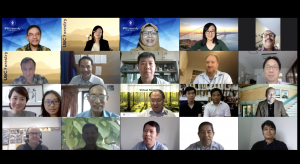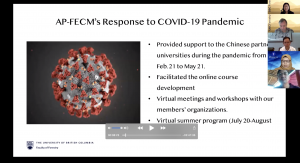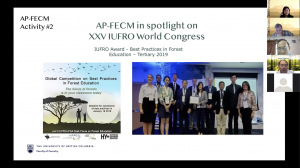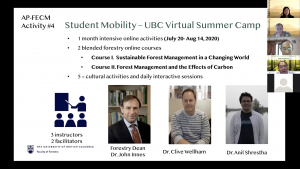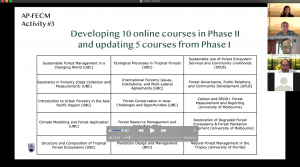Theme: Actions and cooperation from AP forestry universities to address the COVID-19 Pandemic
On July 8th2020, a virtual seminar organized by the UBC Faculty of Forestry, on behalf of the Asia Pacific Forestry Education Coordination Mechanism (AP-FECM), was successfully convened on the topic of Actions and cooperation from AP forestry universities to address the COVID-19 Pandemic among the Asia Pacific Region. More than 30 participants including university presidents, deans and professors from various economies were invited to attend this seminar.
The Dean of the Faculty of Forestry UBC and the Chair of AP-FECM, Dr. John Innes, opened the seminar with a remarkable speech in which he noted that this has been an extraordinary time for everyone, not just the universities but also the whole world. Even though some economies and universities have surmounted the epidemic, in some other cases we are still dealing with very severe situations. Fortunately, the majority of economies our members are either influenced quite lightly at the beginning and did not get very severe threat from the epidemic, or they were able to control the situation. Under these circumstances, it’s good timing now for us to virtually exchange our experiences and strategies on coping with the pandemic, which also might be a mean for future communication among the AP-FECM members with much less cost. The Assistant Executive Director of APFNet, Mr. Zhongtian Zhang, pointed out in his opening remarks that this is an encouraging seminar to meet all the old and new friends. He also highlighted the crucial role of the AP-FECM in the communication and collaboration among the regional forestry education institutes. He noted, since the establishment in 2011, the Mechanism has served as a great collaborative platform to share recourses, exchange experiences among the forestry institutions, enhance the cooperation and innovation as well as catalyze reforms of forestry education. Thus, the AP-FECM has largely improved the capacity of the sustainable forest management in the Asia Pacific region.
As the Director of the AP-FECM Executive Office, Dr. Guangyu Wang, who is also the Associate Dean of the Faculty of Forestry UBC, made a comprehensive presentation about the progress update for the AP-FECM. Firstly, Dr. Wang reviewed the actions from AP-FECM Executive Office in response to the COVID-19 pandemic. During the spring term (from February to May 2020) when most of the students in China had their university education disrupted by the spread of Coronavirus, with the solid support from the APF Net, AP-FECM opened 8 free online courses for Chinese universities. These award-winning online courses attracted more than 1500 students from 33 universities. During the activities update from last year, Dr. Wang first highlighted that AP-FECM won in the Global Competition on Best practices in Forestry Education organized by the Joint IUFRO-IFSA Task Force on Forest Education. Then he mentioned that with solid support from APFNet and great efforts from all the Mechanism members, AP-FECM has made substantial progress on online course development and implementation. So far, 10 award-winning courses in total with very innovative design and creative learning activities have been launched on UBC Canvas and UBC Blogs. Aside from that, the plan of releasing one-month virtual learning based summer camp also captured many Mechanism members’ attention. This virtual summer camp, containing 2 blended forestry online courses and more than 5 cultural activities and daily interactive sessions, will be led by Dean Innes with the hope of building up a global learning community during the COVID-19 pandemic. At last, Dr. Wang also made some significant prospective and outlooks on the continuous development of the AP-FECM.
At the following panel discussion session, eight presidents, deans and professors from universities or institutes of various economies, including Canada, China, Indonesia, New Zealand, Bangladesh, the Philippines, Taiwan, Chile and Australia, kindly shared their valuable experiences and stories about how their universities or institutes have been transformed by COVID-19 and how the AP-FECM members should work together to cope with the challenges that we are facing at such a difficult time. Some emerging challenges associated with remote teaching and learning as well as some achievable solutions were raised in this session. As Dean Innes from the Faculty of Forestry UBC noted the UBC team has started to looked into some new technologies such as 3D technologies and two-dimensional 360-degree technology to supply the students with more effective online learning experiences. In a joint presentation, President Youqing Luo and Professor Yu Lin from Beijing Forestry University (BFU) summarized the response of China’s higher education to COVID-19 and also highlighted that more than 95% of students from BFU are quite satisfied with the online courses they provided during the spring semester 2020. Dean Bruce Manley from University of Canterbury New Zealand brought up challenges with assessment processes because the open book exam online might change the nature of the assessment.
Aside from the panel discussion, there was great participation from all the other members in the open discussion session, and many comprehensive and splendid ideas were shared among them. This seminar was a success on all fronts. At the end, all participants expressed their appreciation towards the Executive Office of AP-FECM for the great efforts that have been made around promoting the collaboration and communication of forestry education among the Asia-Pacific region.

